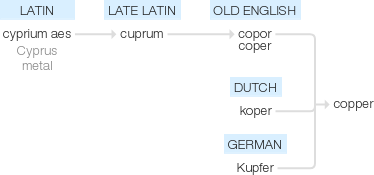Copper
Old English copor, coper (related to Dutch koper and German Kupfer ), based on late Latin cuprum, from Latin cyprium aes ‘Cyprus metal’ (so named because Cyprus was the chief source).
wiktionary
From Middle English coper, from Old English coper, copor(“copper”), from Late Latin cuprum(“copper”), contraction of Latin aes Cyprium(literally “ Cyprian brass”), from Ancient Greek Κύπρος(Kúpros, “Cyprus”). Cognate with Dutch koper(“copper”), German Kupfer(“copper”), Icelandic kopar(“copper”).
From cop(“to take, capture, seize”) + -er(“agent suffix”).
etymonline
copper (n.1)
malleable metallic element, noted for its peculiar red color, tenacity, malleability, and electric conductivity, late Old English coper, from Proto-Germanic *kupar (source also of Middle Dutch koper, Old Norse koparr, Old High German kupfar), from Late Latin cuprum, contraction of Latin Cyprium (aes) "Cyprian (metal)," after Greek Kyprios "Cyprus" (see Cyprus).
Ancient Greek had khalkos "ore, copper, bronze;" an old IE word for "ore, copper, bronze" is retained in Sanskrit ayah, Latin aes. Latin aes originally was "copper," but this was extended to its alloy with tin (see bronze), and as this was far more extensively used than pure copper, the word's primary sense shifted to the alloy and a new word evolved for "copper," from the Latin form of the name of the island of Cyprus, where copper was mined (the alchemists associated copper with Venus).
Aes passed into Germanic (which originally did not distinguish copper from its alloys) and became English ore. In Latin, aes was the common word for "cash, coin, debt, wages" in many figurative expressions. Chemical symbol Cu is from cuprum.
As "a copper coin," from 1580s; as "a vessel made of copper," 1660s. The adjective, "of or resembling copper," is from 1570s; the verb, "to cover with copper" is from 1520s.
copper (n.2)
"policeman," 1846; probably an agent noun from the verb cop "to seize, to catch, capture or arrest as a prisoner" (see cop (v.)).
